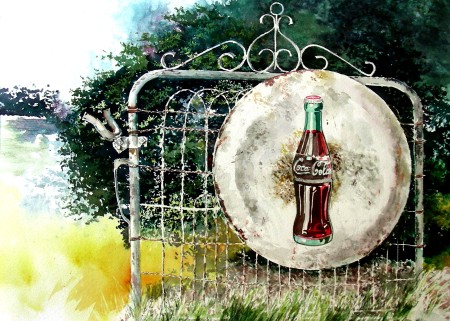I am rolling a rock uphill, Zola! And either I keep on rolling it forever or I let it roll back on me and crush me. But the thing that keeps me going is the hope, the belief that one day I will pick up the boulder with my hands and hurl it to the stars.
Paul Cezanne
I regret the lengthy hiatus between my recent posts. There have been too many details recently chewing out large chunks of my weekdays and weekends. It has been difficult even to find time for quality sleep. High school and university classes, studio time and weekend art festivals are all demanding attention. I am never caught up.
Recently I have been re-watching The Impressionists, a BBC presentation that always fills me with inspiration. We are using the film in my Advanced Placement Art History class as a springboard for studying and writing about nineteenth-century French painting. In a moving moment, the troubled Paul Cezanne pours out his heart to friend and novelist Emile Zola that he feels he is Sisyphus condemned to rolling a rock up the hill, only to have it return to earth, crushing him beneath its oppression. I am moved by that sentiment, though I don’t regard my life as hopelessly chained to a task, long on toil and short on reward. Rather, I acknowledge myself as one who pursues (perhaps?) too many interests. I love scholarship, teaching, studying art, making art, and the business of marketing my art. But I’m aware that people my age are expected to be settled, having found their place in the world. I don’t feel that I have yet found that–I’m still chasing ideas, still filled with enthusiasm and aware that time is running out for me. Granted I earned my graduate degrees nearly thirty years ago, and discovered my talent for painting even before that. And I have been standing in front of classrooms for a quarter of a century. Nevertheless, life is new daily, ideas are always emerging, and I find myself still searching, chasing, wondering. And the search, particularly now, can wear me down physically. I’m just grateful at this moment that I am not worn down emotionally. I still like what I do–I just wish I possessed more energy to do it, and wish that time wasn’t so short.
As I watch the film and read of the historical accounts, I find myself wishing that I could have my own Cafe Gerbois as the French Impressionists did. What I would give for my own think tank, a forum with kindred spirits, gathered for the daily or weekly task of sorting things out. That is the one element missing from my life right now–decompression time, quiet time. Descartes had his stove, Hume had his cottage and Thoreau had his Walden. I have lacked the time recently to enter that sacred space, that sanctuary, and be still. At this moment, I would give anything for my quiet alone time, or for time in a cafe with others engaged in the Search.
Thanks for reading.
I paint in order to remember.
I journal when I feel alone.
I blog to remind myself that I am not alone.





